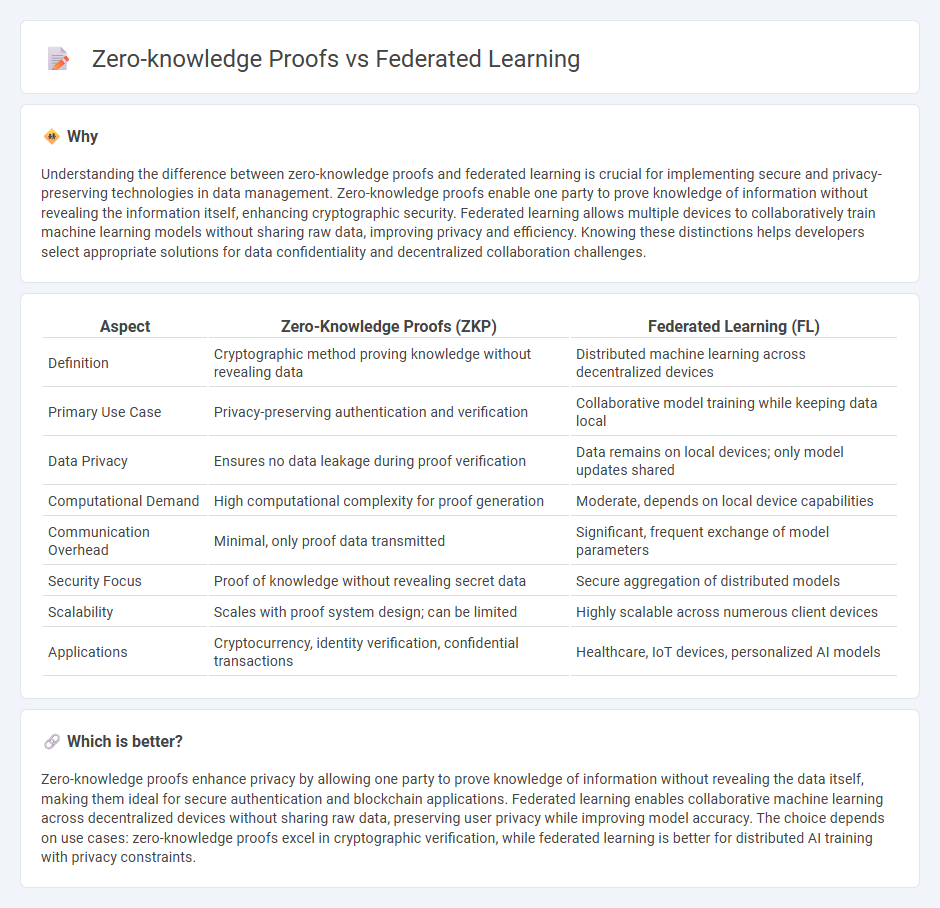
Zero-knowledge proofs enable one party to prove knowledge of information without revealing the data itself, ensuring privacy in digital transactions. Federated learning allows multiple devices to collaboratively train machine learning models without sharing raw data, enhancing security and data autonomy. Explore these cutting-edge technologies to understand their applications in secure computing.
Why it is important
Understanding the difference between zero-knowledge proofs and federated learning is crucial for implementing secure and privacy-preserving technologies in data management. Zero-knowledge proofs enable one party to prove knowledge of information without revealing the information itself, enhancing cryptographic security. Federated learning allows multiple devices to collaboratively train machine learning models without sharing raw data, improving privacy and efficiency. Knowing these distinctions helps developers select appropriate solutions for data confidentiality and decentralized collaboration challenges.
Comparison Table
| Aspect | Zero-Knowledge Proofs (ZKP) | Federated Learning (FL) |
|---|---|---|
| Definition | Cryptographic method proving knowledge without revealing data | Distributed machine learning across decentralized devices |
| Primary Use Case | Privacy-preserving authentication and verification | Collaborative model training while keeping data local |
| Data Privacy | Ensures no data leakage during proof verification | Data remains on local devices; only model updates shared |
| Computational Demand | High computational complexity for proof generation | Moderate, depends on local device capabilities |
| Communication Overhead | Minimal, only proof data transmitted | Significant, frequent exchange of model parameters |
| Security Focus | Proof of knowledge without revealing secret data | Secure aggregation of distributed models |
| Scalability | Scales with proof system design; can be limited | Highly scalable across numerous client devices |
| Applications | Cryptocurrency, identity verification, confidential transactions | Healthcare, IoT devices, personalized AI models |
Which is better?
Zero-knowledge proofs enhance privacy by allowing one party to prove knowledge of information without revealing the data itself, making them ideal for secure authentication and blockchain applications. Federated learning enables collaborative machine learning across decentralized devices without sharing raw data, preserving user privacy while improving model accuracy. The choice depends on use cases: zero-knowledge proofs excel in cryptographic verification, while federated learning is better for distributed AI training with privacy constraints.
Connection
Zero-knowledge proofs enable secure verification of data without revealing the data itself, enhancing privacy in federated learning systems where multiple decentralized devices collaboratively train AI models. Federated learning benefits from zero-knowledge proofs by ensuring that individual data contributions remain confidential while validating model updates. This combination strengthens data security and trust in distributed machine learning environments.
Key Terms
Data privacy
Federated learning enables data privacy by training machine learning models across decentralized devices without transferring raw data, reducing exposure to centralized breaches. Zero-knowledge proofs enhance privacy by allowing one party to verify knowledge of a secret without revealing the secret itself, securing sensitive information during validation processes. Explore how these technologies revolutionize data privacy in decentralized systems.
Decentralization
Federated learning enables decentralized AI model training by distributing data across multiple devices, preserving privacy while avoiding centralized data storage. Zero-knowledge proofs enhance decentralization in blockchain networks by allowing verification of transactions without revealing sensitive information, ensuring trust without a central authority. Explore how these technologies advance decentralized systems by balancing privacy and security.
Trustless computation
Federated learning enables collaborative model training across decentralized data sources without sharing raw data, preserving privacy while improving machine learning performance. Zero-knowledge proofs provide cryptographic verification that computations or statements are true without revealing underlying data, ensuring trustless validation in decentralized systems. Explore the nuances of trustless computation models by understanding their distinct roles and applications in privacy-preserving technologies.
Source and External Links
What Is Federated Learning? | IBM - Federated learning is a decentralized ML approach where global models are trained across distributed nodes using local data, preserving privacy by keeping sensitive data on devices while aggregating model updates centrally.
What is federated learning? - IBM Research - Federated learning enables collaborative AI training without data sharing, using iterative local training on private data with encrypted update aggregation to improve a central model, supporting horizontal, vertical, and transfer learning scenarios.
Federated learning - Wikipedia - Federated learning is a machine learning technique where multiple clients train models collaboratively on heterogeneous, decentralized data sets, exchanging only model parameters to address data privacy and heterogeneity issues.
 dowidth.com
dowidth.com